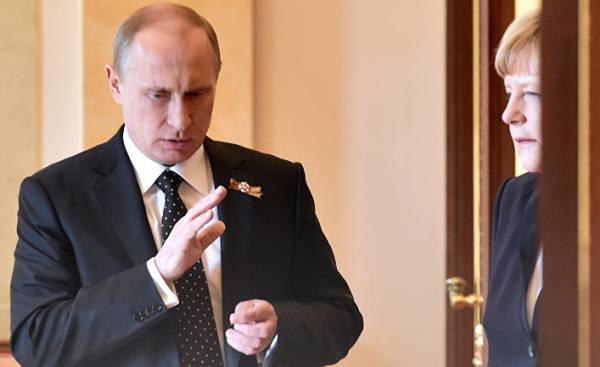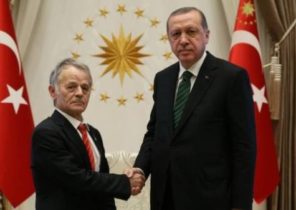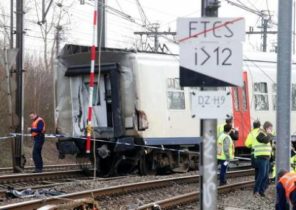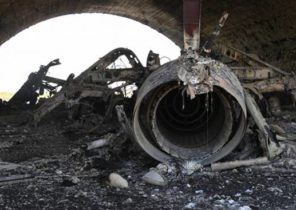
Professor of modern Russian civilization from Nanterre Jean-Robert Ravio recently released work “Russia: towards a new cold war?” and now answers questions l’arène nue about the relations between Russia and Europe.
L’arène nue: Russia is often described as a Eurasian country at the crossroads of two continents, but with a strong focus on Europe. This is still true today with the rapid development of Asia, and in some cases the complex relations of Moscow and Europe?
Jean-Robert Ravio (Jean-Robert Raviot): Russia, rather, represents the state of the continent, not the state at the junction of two continents. Her fate is tied to both of them, but it really belongs to neither of them.
Russians overwhelmingly feel not quite Europeans, namely Russians. At the same time they are aware of close ties with Europe because of the language, history, culture and religion. Therefore, there is no doubt that most of them feel more Europeans than Asians. And although the Russians do not feel themselves Europeans, they feel that they are “in Europe”. Especially in the post-Soviet period, many Russians began to travel to Europe. Some live there, or even settled there. There are so many new friendships and professional relationships. I will not mention the many Russian-French, Russian-German, Russian-Italian families… Today it is even possible to speak about existence of the Russian Diaspora. If you want more info to understand the situation, I suggest you to see the beautiful work of my colleague Olga Bronnikova of Russian expats, their circle of friends and community in Paris, London, Berlin…
I would add that Europe is not perceived as a threat to Russia, although this feeling could be caused by the recent history of two invasions in two centuries: Napoleonic France in 1812 and Nazi Germany in 1941.
The issue of relations with Europe and the West occupies a Central place in Russian thought and reasoning about Russian identity at least since the late eighteenth century. Here I can only recommend the recently released work Michelle Nickname (Michel Niqueux) “the West through the eyes of Russia, the anthology translation and commentary”. The West is simultaneously attracts and repels, it is “decaying” and “civilized”…
Finally, I want to emphasize that many Russians think that Europeans and particularly the French don’t like them. Many of those who love France, its art, literature, history and culture, say that the answer is almost don’t see the love for Russia. Many Russian friends were amazed and deeply disappointed, both in the public mind their country is reduced to hackneyed stereotypes, a gross journalistic clichés, politicized positions. Today, the figure of Putin overshadows everything when it comes to Russia. In the 1990-ies it was the mafia and the oligarchs…
I usually suggest to my students, and now, therefore, all your readers to watch a great film of Alexander Sokurov “Russian ark”. This extraordinary picture was shot in the Hermitage and is a very poetic and lyrical reflection of the complex relationship between Russia and Western Europe over two centuries of history…
— You say that the Russians do not perceive Europe as a threat. At the same time some European countries like Sweden and the Baltic States feel threatened by Russia. The war in Ukraine and annexation of Crimea could not but reinforce the sense of danger. Do you think they really feel threatened? Russia has re-emerged Imperial ambitions?
— The feeling of Russian threat in these countries is quite real and justified in historical terms. Anyway, now the Russian threat seems to me a pure fallacy. However, international policies directed forward not only reality, but perception and presentation…
After the entry of Poland and the Baltic republics in NATO, the Baltic States once again became an important strategic border in Europe. The black sea also plays a similar role, but it happened before: during the cold war (the confrontation between the USSR and Turkey, a NATO member). As a result, the entire space between the Baltic and Black seas — Intermarum —, where, after the First world war, Pilsudski’s Poland intended to increase its influence in the countries of Central and Eastern Europe was again in the center of the struggle of the great European powers. The tension arises where there are clearly lined areas of influence: Ukraine, Moldova, to a lesser extent Belarus.
Russia, I think, is not guided by Imperial or neo-Imperial strategy, and post-Imperial policy, which is to preserve the possible influence or means to counter in an environment of constant expansion of the “Western bloc” led by Washington over the last 20 years. This means three things. First, the official opposition to NATO membership in any Russia’s neighboring States. Second, opposition to the strategic deployment of “Western bloc” at the Russian border (this relates primarily to the us missile defense system). Thirdly, the use of all levers of influence in neighboring countries (assistance to minorities and opponents of Kiev, Tbilisi and Tallinn, the Russian-speaking population in the “near abroad, etc.).
Recently in Bulgaria and Moldova held elections, in which victory went to the Pro-Russian candidates. Can the countries of Central and Eastern Europe (both EU members and not) to make a choice in favor of more development of relations with Moscow, since Europe is bogged down in problems that undermine its attractiveness?
— I believe that Russia, of course, can offer them resources, particularly in energy, but they require the fulfillment of certain conditions (the decision on the construction of pipelines should not be taken for a year, it’s part of a long-term strategy) and is very limited. The EU remains very attractive, despite that the political and economic crisis. At the same time, there is a gradual retreat to the second plan for a political imperative or the EU, or Russia. This confrontation, inherited from the cold war mindset, largely contributed to the emergence of the Ukrainian crisis. It is necessary to cope with the cold war in their heads. This is one of the most important tasks of Russia and Europe, as I noted in the book “Russia: towards a new cold war?” Ukraine has found itself at an impasse. Other countries understand that the future for the reconciliation of the two forces and negotiations (or bargaining) between the EU and Russia.
When in 2014 in Kiev were waving in the streets of European flags, people are not praising the European construction and called for the liberation invasion of NATO troops (if you remember one stereotype of Russian propaganda), and idealized Europe, made her a symbol of hope for the much desired social, economic and political progress… In Moscow perfectly understand that. But in Brussels and Berlin not yet…
— Expert in Germany Hans Kundnani wrote in the beginning of 2015, in Foreign Affairs, that Germany varies between links with the West and the historical tendency to identify themselves with Russia for deep historical reasons. The German press, in turn, periodically releases articles about Russian-German relations with very symbolic titles like “soul mate”. The two countries have a special relationship?
— Russia and Germany have long-standing close, complicated and passionate relationship… they can be a lot, a lot to say. It would not have been able to fit into the format of the interview. I don’t think that Germany today is between several directions. The dispute about the special path of Germany and the Weimar Republic were in the past… Germany occupies a Central position in Europe and whether you like it or not, connected with Russia. Similarly, Russia is tied with Germany, whether you like it or not. Economic relations will deepen and continue. Incidentally, both countries have developed a joint business. There is no doubt that the potential strengthening of Russian-German relations would have to rebuild the security architecture of our continent, especially if it was accompanied by an increase of the distance from us allies and patrons and weakening of ties of the French-German Duo…
Suppose the Euro collapses, NATO will weaken because of the decisions of the United States, and the EU is significantly losing ground… Then Berlin will seek closer cooperation with Moscow, to the defence Alliance, which will enable it to strengthen its very strong influence in Eastern Europe. However, before turning Germany to the East and to the rupture of relations with the West is still very far away. She can’t settle for the Russian market (even including Central Asia), because it was too small, and its solvency is too dependent on world prices for raw materials. Germany required a reliable and solvent customers in large and growing markets. Thus, the main priority is the domestic market of Germany (i.e. Europe and primarily the Eurozone), as well as markets in North America, China and India in the future. In other words, I do not believe in turning the German policy towards Russia or Eurasia.
— You agree to periodically voiced the opinion that Russia wants the collapse of the European Union?
— Moscow never believed in a United political Europe and never wanted her because of the EU from the very beginning is considered as conceived by the Washington project for the sustainable legitimize its domination in Europe and the transformation of Germany into a lever for Euro-Atlantic bloc. Therefore, gaining across Europe, the wave of nationalism and populism seems attractive Russia. It is regarded as the rise of European Nations against the clutches of the EU, which is sometimes compared with the former Soviet Union… the Russian press often writes about going in this direction the statements of conservatives and populists from the Czech Republic, Poland and Hungary. Viktor Orban is the best that vision of the EU as a “soft” version of the USSR: he spent this parallel in their speeches.
Russia primarily acts as a pragmatic and realistic actor in international relations. She is interested in the European single market from the point of view of norms (so much easier for economic and trade relations) and thus does not want the collapse of the EU as a single market and customs Union. In addition, dealing with the implementation of the Eurasian Union of Russian diplomats and officials often take a blueprint of the European samples…







